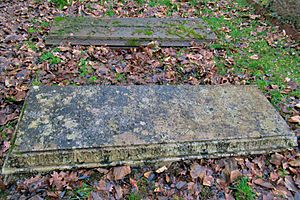Elinor Jenkins facts for kids
Elinor May Jenkins (born 1893 – died 1920) was a British war poet. War poets are writers who create poems about the experiences of war. Elinor wrote about the feelings and events during World War I.
Contents
Who Was Elinor May Jenkins?
Elinor May Jenkins was a talented poet who lived during a very important time in history. She used her words to share deep feelings about the war and the people involved. Her poems helped others understand the emotions of those living through such difficult times.
Her Early Life
Elinor was born on September 3, 1893, in Bombay, India. Her father, Sir John Lewis Jenkins, was an important government worker there. He even became the Vice President of the Indian Viceroy's Council, which was a high-ranking position. Her mother was Florence Mildred Trevor.
In 1901, when Elinor was eight years old, her family moved back to Britain. They lived in a place called 'The Beehive' in Littleham, Exmouth, Devon. Elinor went to Southlands School in Exmouth. After her father passed away, the family moved again to Sussex House in Kew Road, Surrey.
A Poet's Voice in Wartime
Elinor's poems about World War I were first published in a book called "Poems" in 1915. The book was put out by Sidgwick and Jackson. Later, in 1921, the book was re-released with 16 more poems.
Newspapers and magazines reviewed her work. The Western Daily Press said that Elinor wrote with "deep feeling" about loved ones going off to war. They noted her "sympathy and love" for the soldiers who were brave enough to fight and die for their country. Another review in The Evening Star mentioned her poem 'The Last Evening'. It described how she showed the sad feelings when a soldier brother leaves for war. It was like a family dinner where the young soldier goes straight to the battlefield.
Among the legions of beleaguering fears, Still we sat on and kept them still at bay,
A little while, a little longer yet,
And wooed the hurrying moments to forget
What we remembered well,
—Till the hour struck—then desperately we sought
And found no further respite—only tears
We would not shed, and words we might not say.
We needs must know that now the time was come
Yet still against the strangling foe we fought,
And some of us were brave and some
Borrowed a bubble courage nigh to breaking,
And he that went, perforce went speedily
And stayed not for leave-taking.
But even in going, as he would dispel
The bitterness of incomplete good-byes,
He paused within the circle of dim light,
And turned to us a face, lit seemingly
Less by the lamp than by his shining eyes.
So, in the radiance of his mastered fate,
A moment stood our soldier by the gate
And laughed his long farewell—
Then passed into the silence and the night.
Poems About War
Elinor also wrote a poem called 'H.S.T. Requiescat'. This poem was for her uncle, Lieutenant Harry Spottiswoode Trevor. He was killed in action at the age of 26. A magazine called Country Life said it was "a piece of exquisite writing."
Now he is safe from any further ill, Nor toils in peril while at ease we sit,
Yet bides our loss in thinking of him still,—
Of sombre eyes, by sudden laughter lit,
Darkened till all the eternal stars shall wane;
And lost the incommunicable lore
Of cunning fingers ne'er to limn again
And restless hands at rest for ever more.
Another poem, 'Epitaph on a Child left buried abroad', was included in a book called "Poems from India, by Members of the Forces" in 1945.
Father, forget not now that we must go, A little one in alien earth low laid;
Send some kind angel when Thy trumpets blow
Lest he should wake alone, and be afraid.
Elinor's poems have been included in many collections of war poetry. They are still reprinted today, even in the 21st Century.
Her War Work and Sad Passing
During World War I, Elinor worked for the government. In 1917, she became a clerk in the Censor's Department at MI5. This department was responsible for checking letters and other communications during the war. She was still working there when she passed away.
Elinor died on February 28, 1920. She got the influenza during the terrible Spanish flu epidemic that spread across the world. She was only 26 years old. She is buried in Richmond Cemetery next to her brother, Arthur Lewis Jenkins. He was also a war poet and died in 1917. Other family members are buried there too.
The Western Mail newspaper reported her death. They said she had only been sick for two weeks and her death was unexpected. The newspaper suggested that her hard work for her country during the war might have made her illness worse. Many people were sad to hear about the loss of such a talented poet.
On her grave, there is an inscription that says, "Here lies Elinor May Jenkins, Poet, Dear and gifted daughter of Sir John Jenkins and .... Died 28 February 1920." There is also a Greek inscription on top of her grave. It is from an ancient poem and has been translated to mean:
"Still are thy pleasant voices, thy nightingales, awake;
For Death, he taketh all away, but them he cannot take."
Her Books
 | Janet Taylor Pickett |
 | Synthia Saint James |
 | Howardena Pindell |
 | Faith Ringgold |


